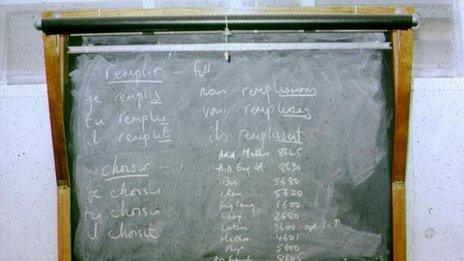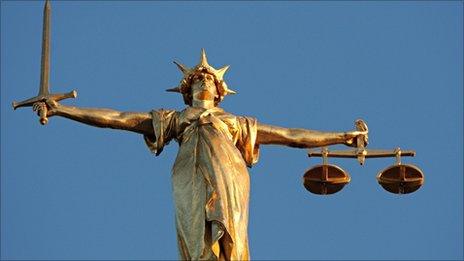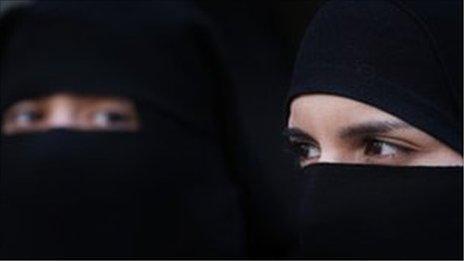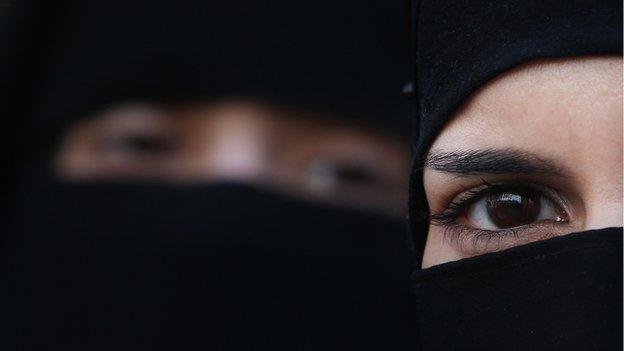Debate needed on veils in some public places, says minister
- Published
- comments
Jeremy Browne fears girls may feel pressured into wearing the veil
The government should consider banning Muslim girls from wearing veils in public places such as schools, a Lib Dem Home Office minister has said.
Jeremy Browne said he was "uneasy" about restricting freedoms, but urged a national debate on the state's role in stopping veils being imposed on girls.
It comes after Birmingham Metropolitan College dropped a ban on pupils wearing full-face veils, amid protests.
A Muslim group said it was "disgusted" by the minister's call.
'Very cautious'
In an interview with the Daily Telegraph, external, Mr Browne suggested action might be needed to protect the freedom of choice for Muslim girls too young to decide for themselves whether they wanted to wear the veil.
"I think this is a good topic for national debate. People of liberal instincts will have competing notions of how to protect and promote freedom of choice," he said.
"I am instinctively uneasy about restricting the freedom of individuals to observe the religion of their choice.
"But there is genuine debate about whether girls should feel a compulsion to wear a veil when society deems children to be unable to express personal choices about other areas like buying alcohol, smoking or getting married."
He added: "We should be very cautious about imposing religious conformity on a society which has always valued freedom of expression."
Speaking on Sunday at the Lib Dem party conference in Glasgow - before the article was published - Mr Browne said the UK had a "proud record" in the country of defending freedom of religious choice and the rights of religious minorities but the state also had a role in protecting peoples' individual liberty.
The minister's comments come after the Birmingham college went back on its policy of telling pupils to remove hoodies, hats, caps and veils so students were easily identifiable.
Instead, it decided to modify its stance to allow individuals to wear "specific items of personal clothing to reflect their cultural values".
Boris Johnson describes the debate as a "very difficult issue"
Mr Clegg told the BBC he did not believe in issuing "edicts from Whitehall" and telling people what pieces of clothing they should wear". He said he believed the wearing of full veils was "not appropriate" in the classroom, but would not support a "state ban" on doing so.
The prime minister's spokesman said he supported schools setting their own uniform guidelines.
'Disgusted'
Sarah Wollaston, the Conservative MP for Totnes, said full-length burkas had "nothing to do with freedom" and prevented some women from "participating fully & equally in society" while the niqab veil - which almost entirely covers the face - made its wearers "invisible".
In a series of messages on Twitter, external, she denied "pandering" to anyone on the issue and suggested politicians who were afraid to talk about the matter risked "selling out women's rights".
"Feminists should be allowed to say that they find the niqab deeply offensive without being accused of being bigoted or islamophobic."
But Mohammed Shafiq of the Ramadhan Foundation - a group that works with young Muslims in the UK and tries to foster better relations with non-Muslims - said he was "disgusted" by Mr Browne's call.
"This is another example of the double standards that are applied to Muslims in our country by some politicians.
"Whatever one's religion they should be free to practise it according to their own choices and any attempt by the government to ban Muslim women will be strongly resisted by the Muslim community."
Mohammed Khaliel, founder of Islamix, a group that aims to build understanding between communities, said: "A small section of the Muslim community do believe that the face veil is mandatory...
"Now, why should I go and rip that off their face saying 'I don't think you should believe that'?"
- Published12 September 2013

- Published23 August 2013

- Published23 July 2011

- Published31 May 2018
